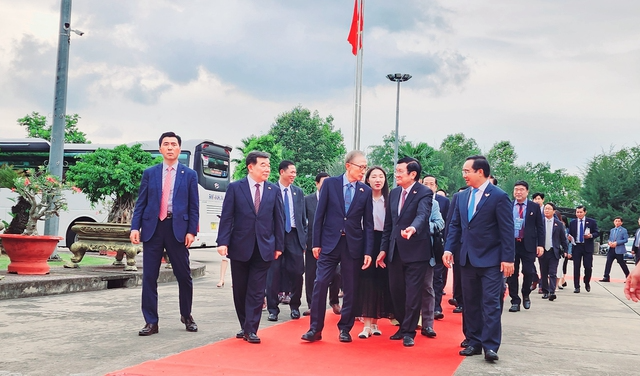The Mekong Delta province of Long An has been focusing on improving its investment climate and public service quality through its District and Department Competitiveness Index (DDCI), which assesses and motivates agencies and localities to improve services.

The Mekong Delta province of Long An has been focusing on improving its investment climate and public service quality through the District and Department Competitiveness Index (DDCI), which assesses and motivates agencies and localities to improve services.
Last year, Long An began carrying out its Long An DDCI by surveying over 1,600 businesses, co-operative groups and business households in the province that use public administrative services.
This index serves as a tool to evaluate the competitiveness and operational quality of various departments and localities, providing an avenue for businesses, investors, and citizens to offer feedback. It also gathers insights into the opinions of businesses and the public regarding the work ethic and service quality of State agency staff, as well as gauging the level of public and business interest in State socio-economic policies.
The targets include 19 provincial-level departments and organisations, as well as 15 district People’s Committees.
The province's DDCI inherits the basic components and some of the indicators of the Provincial Competitiveness Index (PCI), including transparency and access to information; leadership of the organisation; cost of time to carry out administrative procedures and follow legal regulations; unofficial expenses; fair competition; production and business support; effectiveness of legal institutions, and security and order; and access to land.
This initiative also drew on experiences from other cities and provinces, and it is considered to be a big step in the province’s administrative reform efforts to enhance its general competitiveness.
Long An pays a great deal of attention to carrying out the survey and assessment of DDCI in an accurate and objective manner, so that the results can be used to build a friendly and effective government.
A wide range of targets covering many industries are surveyed and interviewed through many methods to ensure that the data is truly representative and trustworthy.
Long An DDCI has been playing a role in motivating localities to proactively improve their administrative services and tackle their limitations to better serve investors and businesses.
For example, Tân Trụ District People’s Committee has been using an AI-powered virtual consultant switchboard called Chatbot for the Long An hotline 1020.
When a person or business in Tân Trụ calls the hotline, the Chatbot system can analyse the caller’s requests and provide a suitable response, following a written script, increasing caller satisfaction and saving time and resources.
The Long An Economic Zone Authority has also been improving its administrative procedures related to the issuance of investment permits. All 44 administrative procedures are processed under the “single window model” (only one agency is involved as opposed to many).
By launching the DDCI, the province’s general investment climate has improved. In 2023, Long An’s PCI ranked second out of the entire country, up eight spots compared to 2022.

During a ceremony held in July, Long An Province recognised and honoured several localities and organisations for their DDCI rankings in 2023.
These included the Long An Economic Zone Authority, Department of Culture, Sport and Tourism, Department of Labour, War Invalids and Social Affairs, Department of Planning and Investment, and the Department of Industry and Trade.
The five districts of Tân Trụ, Tân Thạnh, Châu Thành, Thủ Thừa and Đức Hòa were also recognised for their DDCI rankings.
Many businesses surveyed expressed confidence in Long An’s steadily improving investment climate, noting positive changes in the operations of local agencies—evidence of the province’s commitment to fostering favourable conditions for investors.
Long An aims to further enhance its investment environment by urging agencies to address their limitations and avoid complacency with current achievements. The province is dedicated to raising its standings in competitiveness, environmental protection, and other key areas. — VNS





